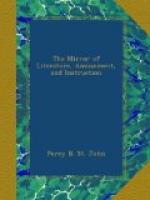confounded, followed with his eyes those whom he could
but fancy to be apparitions, as with noiseless steps
they walked, or rather glided, towards a table which
stood near the fireplace; upon this laid the parish
register, coming in front of which, the man opened
it with a solemn air, and turning over a few pages,
pointed with his finger to some record, upon which
the fair children seemed to gaze with interest and
attention. The trio smiled mournfully at each
other, then moving so that they stood upon the hearth
immediately opposite the foot of Frantz’s bed,
and facing the affrighted young minister, he had full
leisure to contemplate his strange visiters. That
they were of a superhuman nature, he was warranted
in concluding from their appearance in so solitary
a place as Steingart—from their unceremonious
entree at that unusual hour into his dormitory,
and from their movements, actions, and awful silence.
Frantz endeavoured to recollect the form of adjuration,
and also that of exorcism, commonly employed to tranquillize
the turbulent departed, but vainly; his brain was
giddy; his thoughts distracted; his heart throbbed
to agony with terror, and his tongue refused its office.
With a violent effort he sprang up in his bed, and
in his address to the speechless trio, had proceeded
as far as—“In the name of—”
when the children sank down into the very hearthstone
upon which they stood, and the man—Frantz
saw not whither
he went—perhaps up
the chimney—but go he certainly did.
The terrified young man leapt in a state of desperation
from his bed, and searched the apartment narrowly,
as people commonly, but foolishly, are wont to do
in similar cases. His search, as might have been
expected, was useless; but not liking at present to
alarm his domestics with a report of the house being
haunted, he resolved to await further evidences of
the supernatural visitation. Next morning at about
the same hour, the apparitions again entered his apartment;
and acting as they had previously done, gazed earnestly
at him for some seconds ere they vanished. On
the morning of the third day the trio appeared again,
when the gentleman of the long robe, looking most
earnestly at Frantz, pointed to the register, the
children, and the hearthstone; and then, as usual,
disappeared under the same circumstances as before.
Frantz was much distressed; he could not exactly comprehend
the meaning of this dumb show; and yet felt that some
dire mystery was connected with these phantoms, which
he was called upon to unravel. After breakfast
he wandered out, and lost in the maze of thought,
sauntered, ere he was aware of it, into the churchyard.
Shortly afterwards the church-door was opened by the
sexton, who kept his pickaxe and mattock in a corner
of the belfry, and Frantz remembering that as yet
he had not entered the church, followed him in, and
was struck with the appearance of many portraits which
hung round the walls.
“What are these?” said he.




